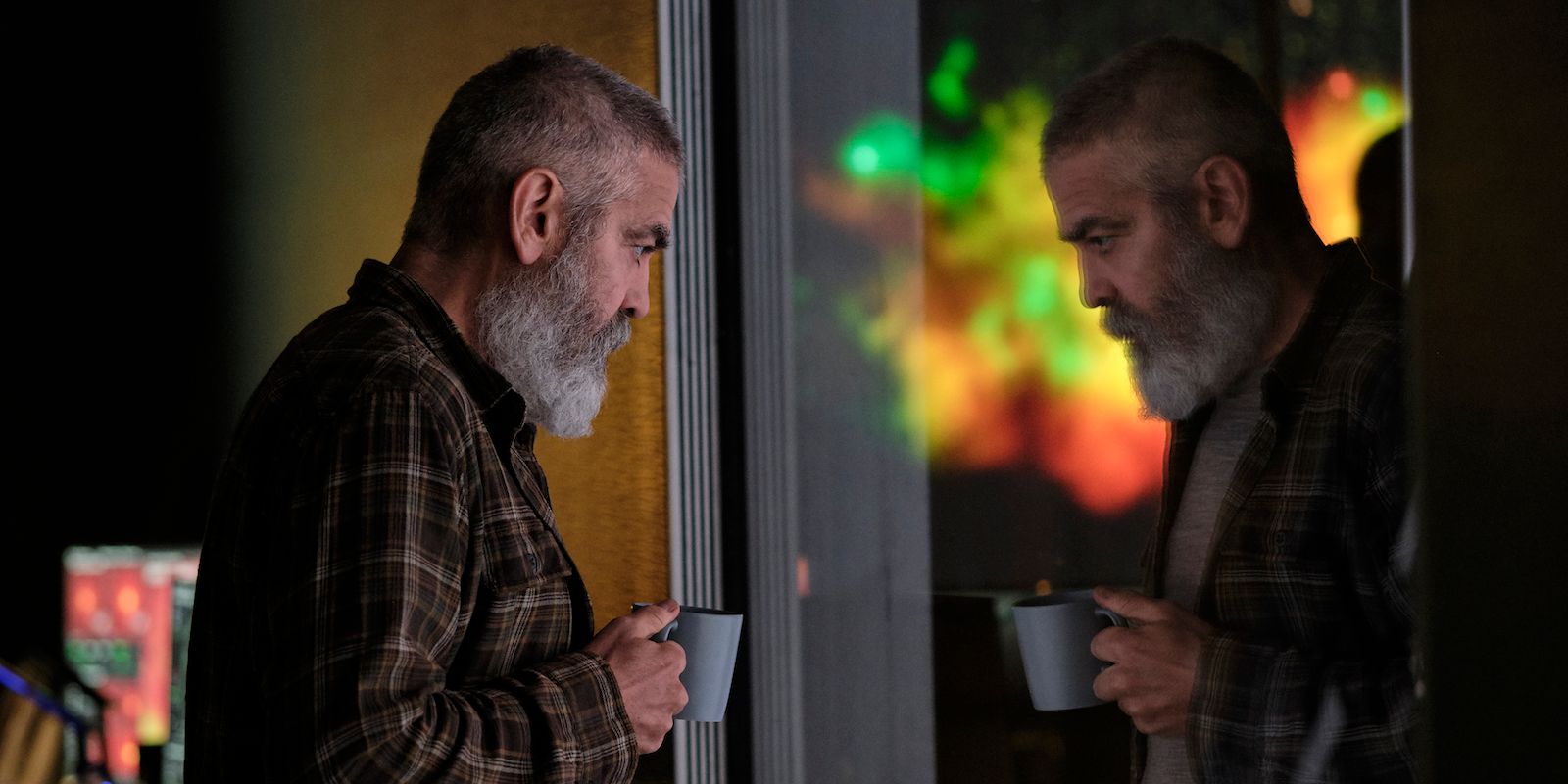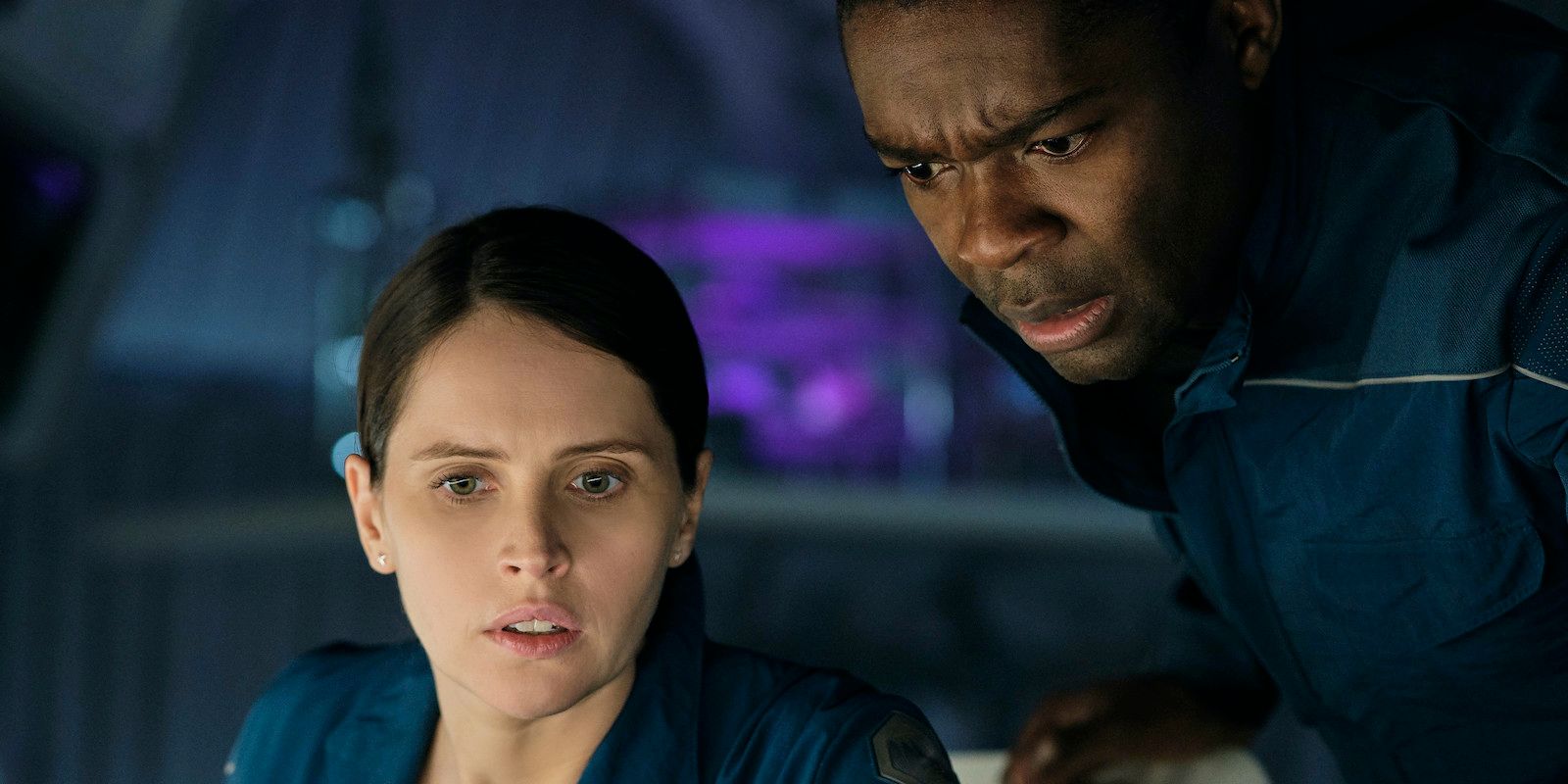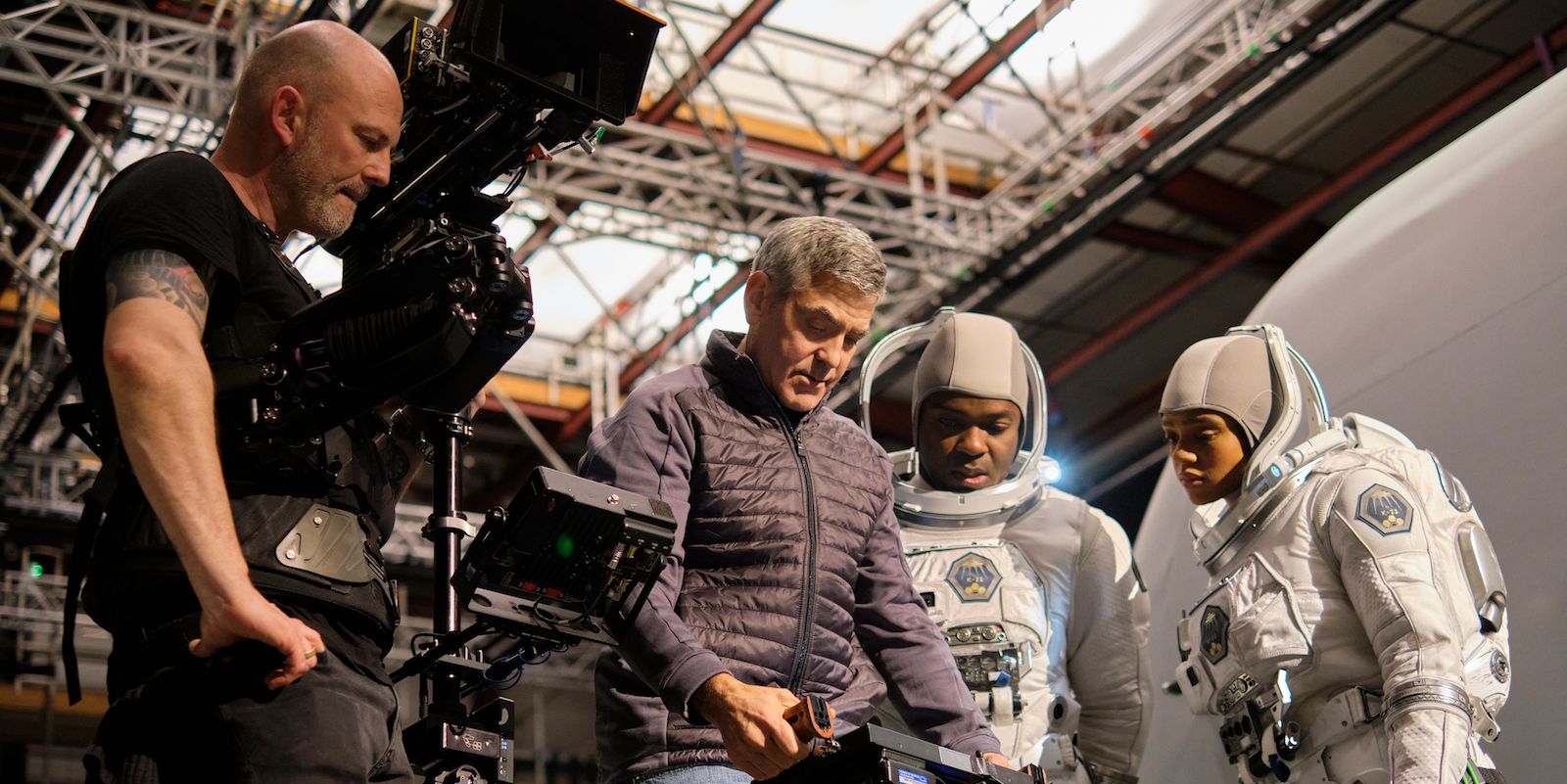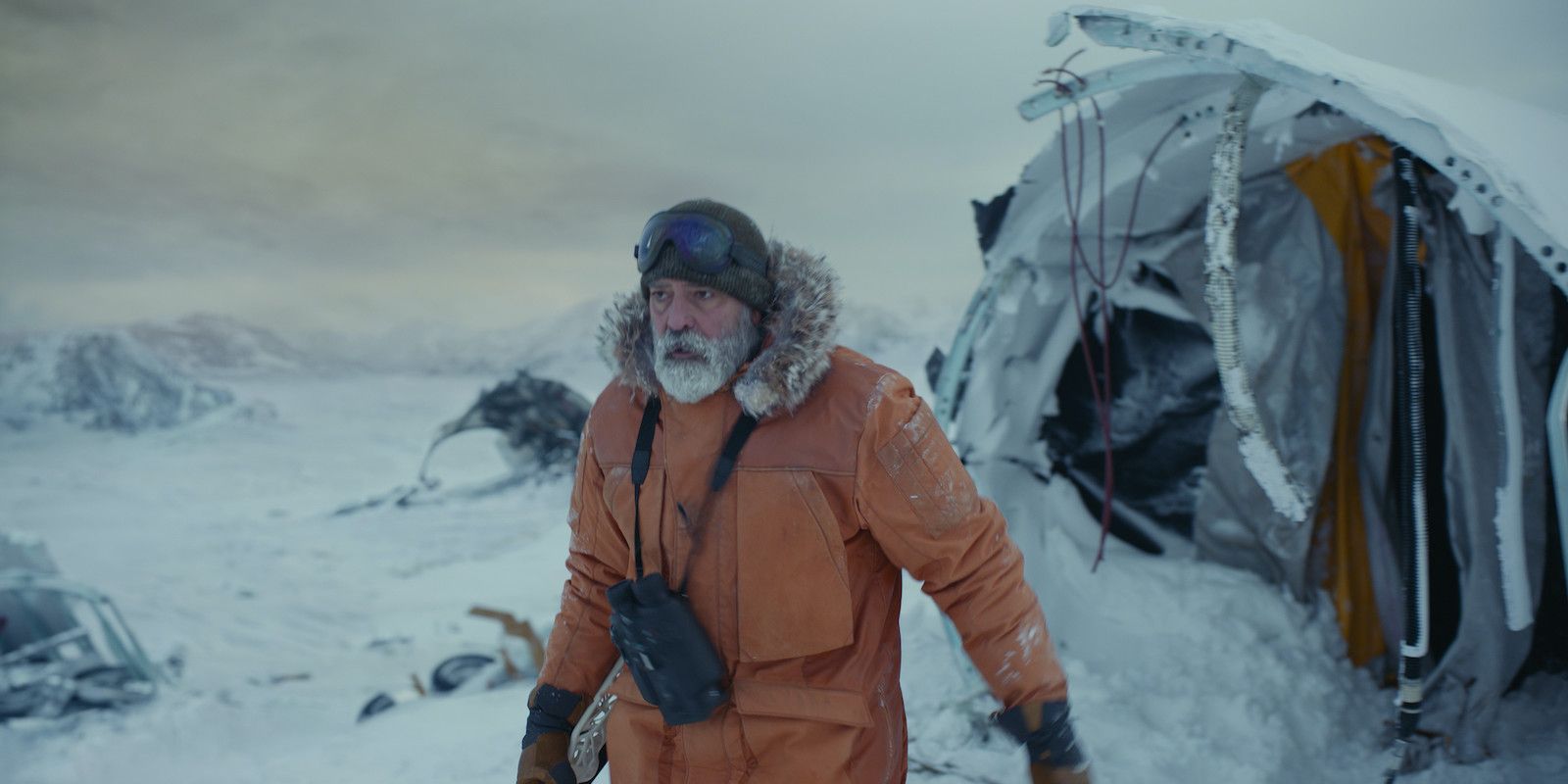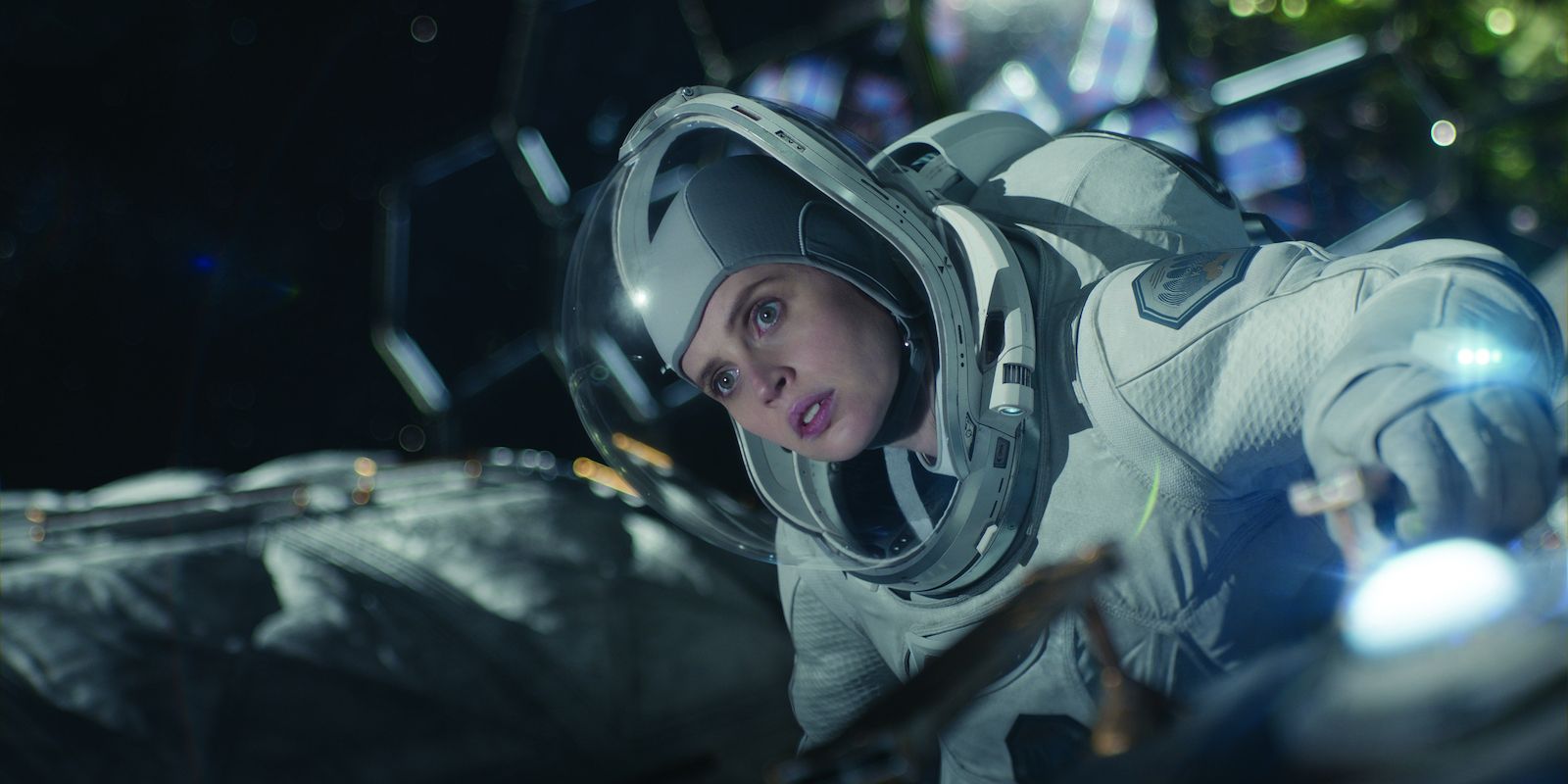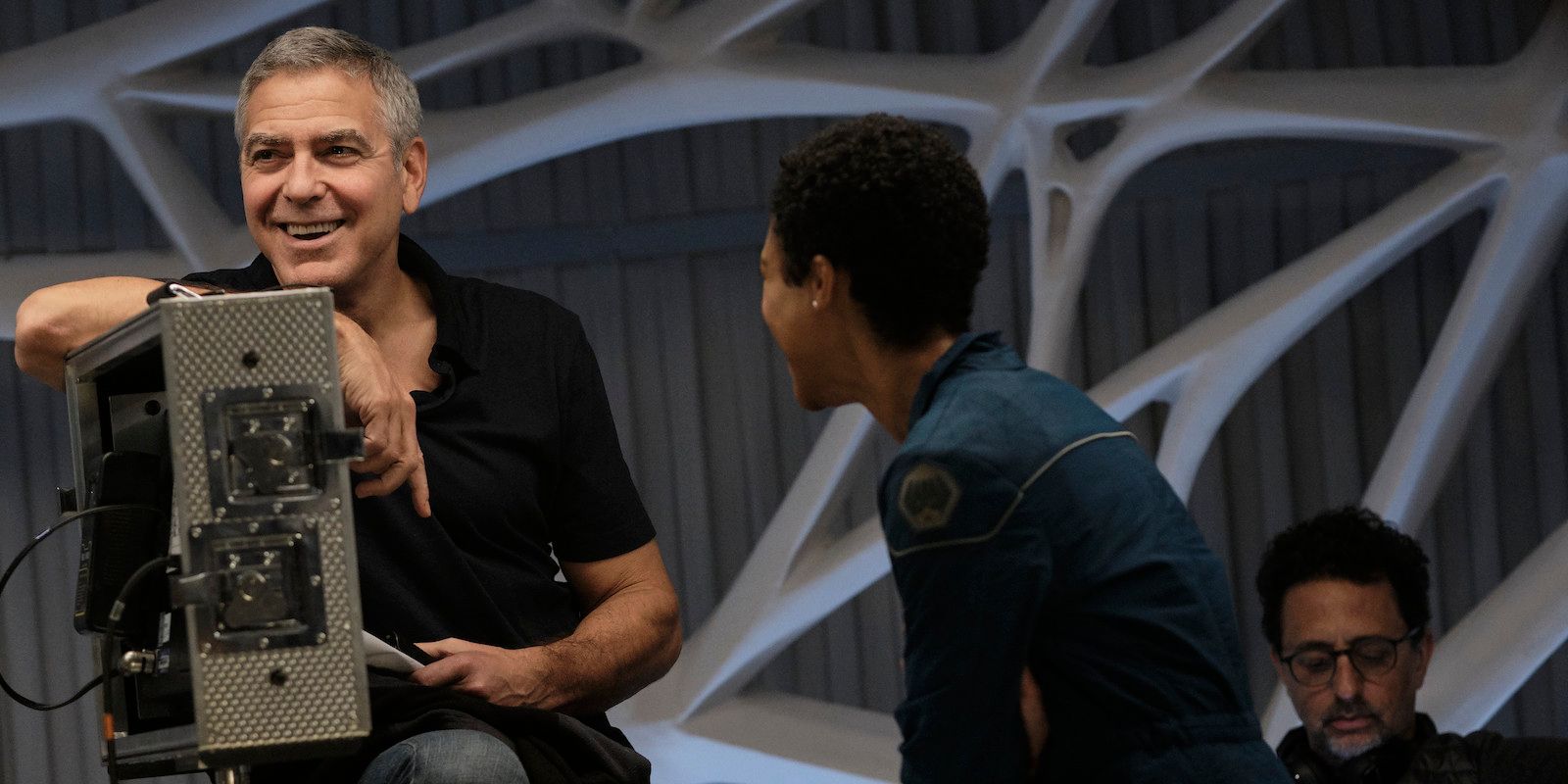Stories about the post-apocalypse abound in pop culture these days, but we've never seen anything quite like George Clooney's latest effort as a director, The Midnight Sky. The film, which was adapted from Lily Brooks-Dalton's novel Good Morning, Midnight, follows two storylines set in the year 2049: in one, a man named Augustine, played by Clooney himself, is the last man in a remote Arctic observatory on an Earth that's been devastated by an unnamed catastrophe; in the other, a group of five astronauts, played by Felicity Jones, David Oyelowo, Kyle Chandler, Demián Bichir and Tiffany Boone, are on their way back to Earth following a mission to find a new planet for humans to colonize. As Augustine races to contact their spaceship and warn them to stay away, the crew desperately attempts to connect with the home they left behind.
In a Zoom press conference, Clooney and his impressive cast gathered to discuss how Jones' unexpected pregnancy helped make The Midnight Sky's post-apocalyptic story feel more hopeful, the reason the pandemic has made the film newly relevant and why Clooney's experience on ER came up during filming.
When Clooney initially pitched the movie, he saw it as a cautionary tale. "When we first started talking about the film, we wanted to talk about what man is capable of doing to man and mankind," Clooney explained. "When I talked to Netflix about my take on it, I was talking about all of the anger and the hatred and all of the things that have been playing out in our lives, not just the United States -- although certainly in the United States -- but all over the world. And how if you played that out for 30 years, it's not inconceivable that we could -- one way or another, if you're denying science, its climate, if it's anger, we could be blowing ourselves to kingdom come -- that it’s not inconceivable that we blow it in a big way. And so to me, the idea was to have that conversation about what we're capable of doing."
Yet, when the pandemic started just as Clooney finished filming, it led him to think about the story the film was telling in a different way. "[The pandemic made it] clear that what the story really was enveloping was our desperate need to be home and our desperate need to be close to the people we love and in communication with the people we love and near them," Clooney noted. "And how difficult that struggle is to communicate with one another, like we're doing now in the weirdest possible press conference I think we've ever done. And so that was the idea of it. The idea was suddenly that these themes, unfortunately, are relative, but no one counted on them to be completely like this."
Jones said from the start that it was the combination of big ideas and more intimate drama that attracted her to the project. "What I always loved about the film and reading the script was that it had both a macro level of being a film about some really massive, huge issues, asking existential questions, asking about the meaning of life," Jones observed. "What are we doing here? Why are we here? What do we value? And interestingly, these are all the questions that we are asking ourselves in this strange epoch that we find ourselves in. So it had these broader brushstrokes, but then at the same time, it was a very intimate relationship drama about trying to forge connection and about family and about being a parent. And so the fact that it moved from the big to the small and did it so well is part of the reason that I wanted to do it, and that it was an entertaining propulsive action movie at the same time."
For the actors, playing the crew of a spaceship presented many challenges, not the least of which was reciting a lot of technical dialogue while still ensuring their scenes were emotionally resonant. Fortunately, Clooney could draw on his past work when directing his cast. "[George] would often talk about his experience on ER and all of that jargon that they had to spout in that show," Oyelowo shared. "And how, basically, learning it as well as you can and saying it as fast as you can is the key, because if you know, or seem to know, what you're talking about, then the audience buy that you know what you're talking about, and then they just get keyed into the emotion of what your character is actually feeling. Don't get hung up on the terminology, as it were, still keep on playing the stakes, keep on playing the emotions."
Yet real life altered some of Clooney's plans for the film when Jones discovered she was pregnant while he was shooting his scenes in Iceland. "I get a call from Felicity," Clooney recalled, "and she says, 'Oh, there's some news.' 'What is it?' She goes, 'I'm pregnant.' And I did it this way, 'Congratulations. We’re very happy, very excited for you.' And then there was this long pause, and we go, 'So what do you want to do?' And she goes, 'I want to do it.'"
"We tried to deny [Jones' pregnancy] for a minute, we tried to pretend that it didn't happen," Clooney added. "So we were shooting around her and shooting things three times, we were going to do head replacements. And then it really came down to the idea that the best versions of things are when you accept them and you don't see them as problems."
From Jones point of view, Clooney's reaction to her pregnancy was a relief, and an even bigger relief came when he came to the conclusion her character in the film should be pregnant too. "Initially I was very worried that I would get fired," Jones confessed. "So it was a great relief when George [...] just made me feel completely comfortable all the way through. And I have to thank him that initially, when I was trying not to look pregnant, then I was denying myself a lot of chocolate cake. So when he said, you can actually be pregnant in the film, I was relieved that I could.”
Clooney noted that the decision to make Jones' character pregnant had the unexpected effect of making the story more hopeful than was initially envisioned. "Once we decided, well, people get pregnant, it happens, so suddenly, it became Wilber -- who's her son's actual name, who by the way, should get screen credit, 'introducing Wilber' -- became a character to us," Clooney said. "The crew of the ship, all of these five wonderful actors sort of joined together in protecting her. It became a family, it became something that was important. And so we could write scenes about naming the kid or doing the ultrasound […]. To me, that suddenly became infinitely more hopeful in there, and there was a real fight for the idea of whether or not this whole thing of mankind is worth the struggle, and you feel as if, when you see that, it is.
"And also, by the way," Clooney continued, "if you finish the film without the last five minutes, in many ways it's a film about regret because of the character that I play. But he gets redemption, and I think redemption is a really big, important thing that washes over us and gives us hope and all of those things. So I found it to be a very hopeful film."
Jones also saw another positive to her character's pregnancy: "We have seen pregnant characters in films, but it's still pretty revolutionary, and particularly a pregnant woman in space is quite extraordinary."
In fact, the diversity of the actors who played the five astronauts offered many opportunities to show people who aren't normally seen working in space. "You don't find too many scripts in this industry with a Mexican playing an astrodynamicist," Bichir noted. "So that alone is great."
Meanwhile, Oyelowo revealed that he and Clooney agreed to change his character's name for a very specific reason. "[This] group of five astronauts have been tasked with finding a planet that humanity can colonize because we have ruined Earth, and so in many ways, these five people have been sent to go off to save the world," Oyelowo observed. "And I think originally my character's name was Commander Harper, as is written in the book. And I was sort of thinking about the fact that this is set some decades in the future, and I realized I'd never seen an African astronauts in a film like this.
"And I loved the fact that, in and amongst us as astronauts, there was a certain amount of diversity there, and I just felt very strongly, being a very proud person of African descent, that a crew tasked with saving the world should have an African in there. And so I asked George if he was open to me changing my name, and we did. We changed it to Adewole, which is a name from the tribe I'm actually from in Nigeria, the Yoruba tribe, and it's going to sound very self-important, but the name means 'the king has entered the house.' And I told George this, and he said, 'Well, that's in the movie.' And that's how it came about. So not only am I very grateful to him about that, but several millions and millions of Africans will be very grateful to see that kind of representation in the film as well."
Directed by George Clooney and starring Clooney, Felicity Jones, David Oyelowo, Tiffany Boone, Demián Bichir, Kyle Chandler and Caoilinn Springall, The Midnight Sky premieres on Netflix on Wednesday, Dec. 23.

